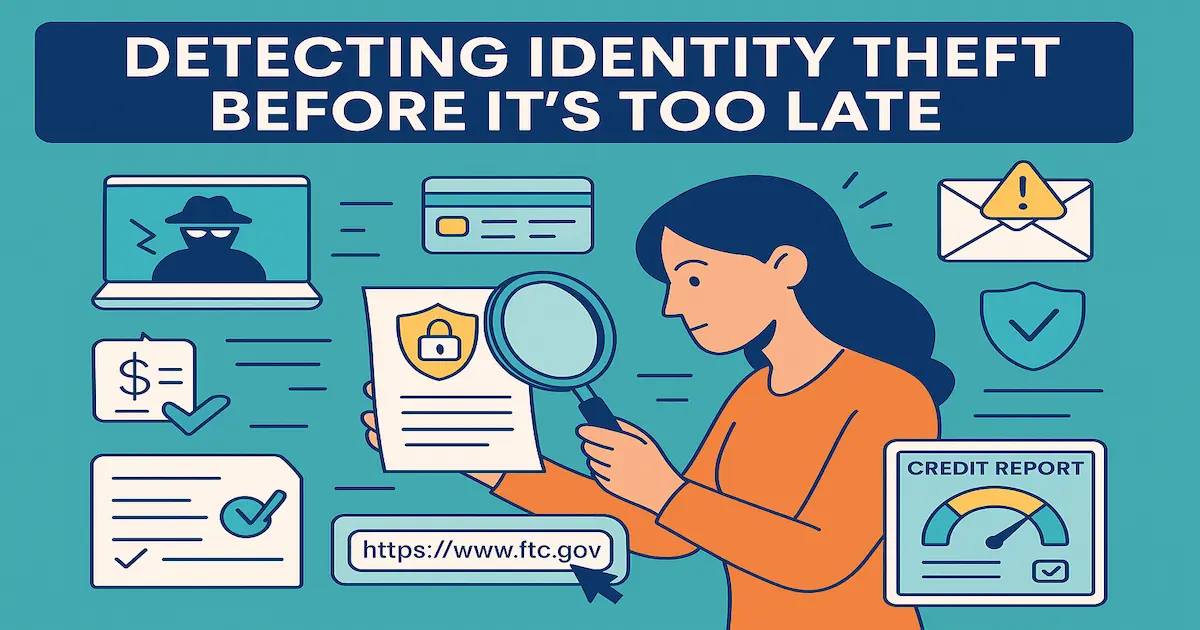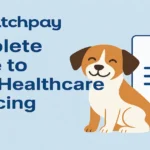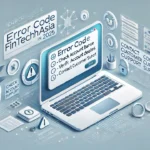In today’s digital age, identity theft is a growing concern for millions of Americans. Criminals are finding new ways to steal personal information and commit financial fraud without being noticed.
From using someone else’s Social Security number to making unauthorized activity on credit cards, the damage can be long-lasting. That’s why it’s important to detect identity theft early before serious harm is done.
When a stolen identity is used, the victim might not notice right away. Often, it takes months or even years before the damage becomes clear.
This delay can lead to credit score changes, bank account fraud, and even problems with the IRS. Early warning signs are key to protecting yourself and taking quick action. Lets dive in!
Unusual Financial Activity: A Key Warning Sign
One of the most common signs of identity theft is strange activity in your financial accounts. If you see strange charges on your bank account or credit card, that’s a clear red flag.
Victims often find unfamiliar transactions, unauthorized purchases, or withdrawals that they didn’t make.
Sometimes thieves use small amounts to test the waters before spending more. Checking your accounts regularly helps you monitor accounts and spot issues. If something looks wrong, contact your bank and ask them to investigate.
| Type of Fraud | What to Watch For |
|---|---|
| Credit Card Fraud | Small unknown charges, maxed out cards |
| Bank Account Fraud | Withdrawals you didn’t make |
| Loan Fraud | Unknown loan or line of credit |
Suspicious Communication: Mail, Emails, and Calls
If you stop receiving bills or unexpected mail starts showing up, it could be another sign of identity theft. Missing mail or new mail about accounts you didn’t open is serious. Thieves often change your mailing address to take over accounts.
Read More: CDiPhone: The Future of Mobile Storage for Archival Needs 2025
Watch out for phishing emails or suspicious emails that ask for your personal details. You may also get calls from debt collectors about loans you never took or receive collection letters. These are clear signs that someone may be using your identity.
Monitoring Your Credit Reports and Scores
It’s important to use credit report monitoring tools to detect new problems. Checking your reports from the three credit bureaus—Equifax, Experian, and TransUnion—can help you find hard credit inquiries and new account alerts you don’t recognize.
If your credit score changes suddenly, especially if it drops without reason, it may mean someone is opening credit in your name. You can get one free credit report each year from each bureau by visiting AnnualCreditReport.com. Reviewing your report regularly is a smart way to protect yourself.
Health Insurance and Tax Record Irregularities
Many people don’t realize that medical identity theft is also a risk. Criminals can use your information to get treatments or prescriptions. This can lead to health insurance fraud and incorrect medical records.
If your tax return is rejected or you receive a notice from the IRS about a return you didn’t file, it could be tax identity theft. The IRS might even flag IRS fraud alerts or notices about your Social Security misuse. These are serious problems that need immediate attention.
Strengthening Your Digital Defenses
Your online safety is one of the best defenses against identity theft. Use strong passwords for each of your accounts. A password manager can help you store and create safe passwords.
Also Visit: Laundromat Startup Costs in 2025: Full Breakdown Guide
Take time to enable account protection features like two-factor authentication. Also, turn on enable notifications for all financial accounts. Following basic cybersecurity tips—like avoiding strange links and keeping devices updated—can greatly reduce your risk of unauthorized activity.
Setting Up Alerts and Credit Monitoring Tools
You can take action by using set up alerts with your bank and credit card companies. These alerts notify you of unfamiliar transactions, new account alerts, or large purchases. Services like LifeLock, Identity Guard, and Credit Karma offer identity monitoring.
In addition to alerts, you can place a fraud alert on your credit file. This tells creditors to verify your identity before approving credit. You can also freeze credit to stop anyone from opening new accounts in your name.
Steps to Take If You Suspect Identity Theft
If you think your identity has been stolen, act fast. First, contact your bank and credit card company. Ask them to stop or reverse any unauthorized activity. Then, report the case to the Federal Trade Commission (FTC).
Visit IdentityTheft.gov to file a report and create a recovery plan. Complete an identity theft affidavit to confirm your claim. Next, contact the credit bureaus to place a fraud alert or freeze credit. Keep a record of all your actions and save emails, letters, or reference numbers.
Preventive Habits to Stay Safe Long-Term
Long-term safety comes from smart habits. Always check bank statements and monitor accounts weekly. Shred old documents and store personal information in a secure place.
Keep software updated to close security gaps. Protect your information by avoiding public Wi-Fi and only entering sensitive information on secure websites. These are key tips for secure online behavior and financial wellness.
Conclusion: Stay Vigilant, Stay Protected
Detecting identity theft early is your best defense. The longer it goes unnoticed, the harder it is to fix. Watch for early warning signs like strange charges, missing mail, or a sudden credit score change.
Stay safe by forming daily habits that protect your personal data. Use tools to monitor accounts, set up alerts, and maintain strong digital security. Being alert and prepared is the best way to stop identity thieves before they do real harm.
FAQs About Detecting Identity Theft Before It’s Too Late
What are the most common early warning signs of identity theft?
The most common signs include strange charges, unfamiliar transactions, missing mail, credit score changes, and contact from debt collectors. These are red flags that someone might be using your personal information.
How can I monitor my identity and credit effectively?
You can use credit report monitoring services from Equifax, Experian, or TransUnion. Many banks also allow you to set up alerts for unauthorized activity. Also, consider using an identity monitoring service for extra protection.
What should I do if I see suspicious activity on my accounts?
Immediately report the issue to your bank or credit card company. Then go to IdentityTheft.gov to file a report and follow the steps to create a recovery plan. You should also place a fraud alert or freeze credit with the credit bureaus.
Can identity theft affect my taxes and medical records?
Yes, criminals can file a false tax return under your name, leading to tax identity theft. They can also use your data to access healthcare, causing medical identity theft or health insurance fraud.
How can I prevent identity theft in the long term?
Use strong passwords, keep devices updated, and follow cybersecurity tips. Regularly monitor accounts, check bank statements, and dispose of documents securely. These habits help with account protection and digital security over time.












